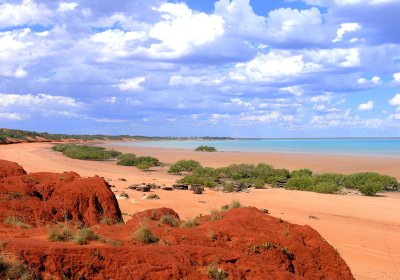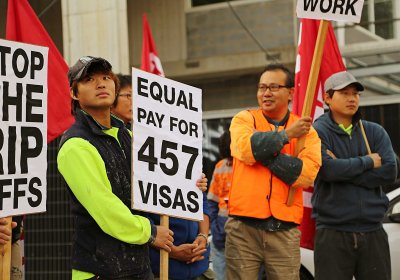A meeting of about 160 residents called by Moreland City Council voted unanimously to reject the proposed East West Link on November 12. The first stage of the major road project is planned to link the Eastern freeway with the Tullamarine tollway at an estimated cost of $8 billion. Residents called instead for the money to be spent on improved public transport.
Andrew Munro, from the Metropolitan Transport Forum, spoke of the need for more investment in public transport.
989
The Tasmanian Aboriginal community and its supporters were outraged over the Aboriginal Heritage Protection Bill that was rushed through the lower house on November 13.
Brian Wightman, minister for environment, parks and heritage, tabled the bill, which will now proceed to the upper house. This bill is intended to replace the outdated and racist Aboriginal Relics Act.
At long last the reality of the human rights crisis in Sri Lanka is appearing in the Australian media. Not just the fact that more than 40,000 Tamil civilians were killed by the Sri Lankan army in a month in 2009, but that Sri Lankans of all ethnic backgrounds continue to be subject to torture, rape, arbitrary detention, disappearance and death.
The Commonwealth Heads Of Government Meeting (CHOGM), which opened in Sri Lanka on November 15, has meant special attention is being paid to these human rights abuses.
About 200 residents blockaded Somerville Road during morning rush hour in the inner-west Melbourne suburb of Kingsville on November 12 to protest against the number of container trucks using the street.
Somerville Road is a two-lane residential road that carries 3000 trucks a day. There are three primary schools and a kindergarten nearby with 1500 children enrolled.
The protest was organised by Maribyrnong Truck Action Group (MTAG) and heard from Maribyrnong Mayor Grant Miles, MTAG president Samantha McArthur, and Merryn Redenbach from Doctors for the Environment.
The corridors of the Australian parliament are so white you squint. The sound is hushed; the smell is floor polish. The wooden floors shine so virtuously they reflect the cartoon portraits of prime ministers and rows of Aboriginal paintings, suspended on white walls, their blood and tears invisible.
The parliament stands in Barton, a suburb of Canberra named after the first prime minister of Australia, Edmund Barton, who drew up the White Australia Policy in 1901. "The doctrine of the equality of man," said Barton, "was never intended to apply" to those not British and white-skinned.
A protest against using the Victorian port of Hastings for brown coal exports attracted 200 people on November 9, including locals and community members from across Gippsland.
Several coal export projects are seeking to use land at Hastings in Western Port, south-east of Melbourne, for a one-square-kilometre brown coal drying facility and port.
"Never before in the history of Latin America have there been such a number of left-wing governments in power at the same time," Steve Ellner, a visiting fellow at the Australian National University and professor in economic history at the Eastern University in Puerto La Cruz, Venezuela, told a public forum in Sydney on November 9.
The forum was organised by the Latin America Social Forum (LASF) and also featured Sarah Motta, senior lecturer in politics at the University of Newcastle. Both speakers had edited editions of the journal Latin American Perspectives earlier this year.
The newly formed Illawarra Aboriginal Solidarity Group will hold a launch on November 21 with the screening of two films at Wollongong TAFE.
The Illawarra region has a strong history of activism around the injustices that Indigenous people face, including past campaign work by the South Coast Aboriginal Advancement League and the Illawarra Aboriginal Rights Group.
Lyle Davis, a Brierley/Piety/Dharawal man, emphasises that while this is the launch of a new group it is continuing on with work that has taken place for many years.
The Western Australian government has finalised its acquisition of land in the Kimberley for future development, despite long-standing opposition from environmentalists and the local Aboriginal community.
The 3414 hectares of land near James Price Point — part of one of the most ecologically opulent and pristine stretches of land left in the world — north of Broome, was bought from traditional landowners as “unallocated crown land.”
The area is now under management of LandCorp and the Broome Port Authority.
Over the years, I have heard many left-wing activists say that mass peaceful protests do not achieve anything. Rather, “militant actions” which “take it up to the ruling class” are more important.
But for smaller direct actions to have any real political significance, they have to be connected to a patient and democratic approach to building mass movements that can win reforms. Smaller direct actions that are not tied to this political aim are a posture.
All workers are treated equal, right? Same award rates for the same work, equal pay for women and uniform national modern laws. But what about workers who are not allowed to work, such as refugees on bridging visas; or workers brought by employers to Australia on 457 visas, who are used for a short time and then sent back?
Are these workers being treated equally and how can their treatment affect the rest of us in the future?
I am a 32-year-old mother of two from suburban Perth. I am writing in regard to the case of Latifa, a 31-year-old woman of the persecuted Rohingya people of Myanmar [Burma], who recently gave birth in immigration detention. Her newborn child is in NICU [neonatal intensive care unit] and her access is strictly limited due to the harsh and inhuman policies of your department. The child has never had any contact with its father also held by your department.
- Previous page
- Page 3
- Next page








